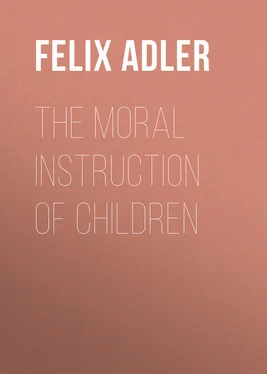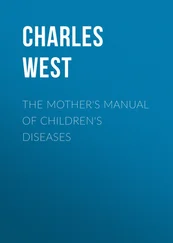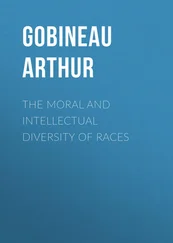Felix Adler - The Moral Instruction of Children
Здесь есть возможность читать онлайн «Felix Adler - The Moral Instruction of Children» — ознакомительный отрывок электронной книги совершенно бесплатно, а после прочтения отрывка купить полную версию. В некоторых случаях можно слушать аудио, скачать через торрент в формате fb2 и присутствует краткое содержание. Жанр: foreign_language, foreign_antique, foreign_prose, на английском языке. Описание произведения, (предисловие) а так же отзывы посетителей доступны на портале библиотеки ЛибКат.
- Название:The Moral Instruction of Children
- Автор:
- Жанр:
- Год:неизвестен
- ISBN:нет данных
- Рейтинг книги:3 / 5. Голосов: 1
-
Избранное:Добавить в избранное
- Отзывы:
-
Ваша оценка:
- 60
- 1
- 2
- 3
- 4
- 5
The Moral Instruction of Children: краткое содержание, описание и аннотация
Предлагаем к чтению аннотацию, описание, краткое содержание или предисловие (зависит от того, что написал сам автор книги «The Moral Instruction of Children»). Если вы не нашли необходимую информацию о книге — напишите в комментариях, мы постараемся отыскать её.
The Moral Instruction of Children — читать онлайн ознакомительный отрывок
Ниже представлен текст книги, разбитый по страницам. Система сохранения места последней прочитанной страницы, позволяет с удобством читать онлайн бесплатно книгу «The Moral Instruction of Children», без необходимости каждый раз заново искать на чём Вы остановились. Поставьте закладку, и сможете в любой момент перейти на страницу, на которой закончили чтение.
Интервал:
Закладка:
Third Point. – What is called conscience does not usually begin to show itself until the child is about three years old. At this age the concept self usually emerges, and the child begins to use the personal pronoun I. This is one of these critical turning points in human development, of which there are several. The beginning of adolescence marks another. I am inclined to suspect that there is one at or about thirty-three. There seem to be others later on. At any rate the first turning point – that which occurs at three – is marked unmistakably. At this time, as we have just said, the child begins to be distinctly self-conscious; it says "I," and presently "you," "he," and "they." Now, moral rules formulate the relations which ought to subsist between one's self and others, and to comprehend the rules it is clearly necessary to be able to hold apart in the mind and to contrast with one another the persons related. It is evident, therefore, that the emergence of the concept self must have a decided effect on moral development.
I feel tempted to pause here a moment and to say a word in passing about the extreme importance of the constituent elements of the concept self. For it must not be supposed that the pronoun "I" means the same thing on the lips of every person who uses it. "I" is a label denoting a mass of associated ideas, and as these ideas are capable of almost endless variation, so the notion of selfhood is correspondingly diversified in different individuals. In the case of children, perhaps the principal constituents of the concept are supplied by their outward appearance and environment. When a child speaks of itself, it thinks primarily of its body, especially its face, then of the clothes it usually wears, the house it lives in, the streets through which it habitually walks, its parents, brothers, sisters, school-masters, etc. 7 7 So important is environment in supporting self-consciousness, that even adults, when suddenly transported into entirely new surroundings, often experience a momentary doubt as to their identity.
If we analyze the meaning of "I" in the case of two children, the one well-born and well brought up, the other without these advantages, we shall perhaps find such differences as the following: "I" in the one case will mean a being living in a certain decent and comfortable house, always wearing neat clothing, surrounded by parents, brothers, and sisters who speak kindly to one another and have gentle manners, etc. In the other case, the constituents of the concept self may be very different. "I" in the case of the second child may mean a creature that lives in a dark, filthy hovel and walks every day through narrow streets, reeking with garbage. "I" may mean the child of a father who comes home drunk and strikes the mother when the angry fit is upon him. "I" stands for a poor waif that wears torn clothes, and when he sits in school by the side of well-dressed children is looked at askance and put to shame. It is obvious that the elements which go to make up the concept self affect the child's moral nature by lowering or raising its self-esteem. I remember the case of one, who as a boy was the laughing-stock of his class on account of the old-fashioned, ill-fitting clothes which he was compelled to wear, and who has confessed that even late in life he could not entirely overcome the effect of this early humiliation, and that he continued to be painfully aware in himself, in consequence, of a certain lack of ease and self-possession. Hence we should see to it that the constituent elements of the concept self are of the right kind. It is a mistake to suppose that the idea of selfhood stands off independently from the elements of our environment. The latter enter into, and when they are bad eat into, the very kernel of our nature.
We have seen that the development of the intellect as it appears in the growing distinctness of self-consciousness exercises an important influence on the development of the moral faculty. But there is still another way in which this influence becomes apparent. The function of conscience further depends on the power of keeping alternative courses of action before the mind. Angels capable only of the good, or fiends actuated exclusively by malice, could not be called moral creatures. A moral act always presupposes a previous choice between two possible lines of action. And until the power of holding the judgment in suspense, of hesitating between alternative lines of conduct, has been acquired, conscience, strictly speaking, does not manifest itself. We may say that the voice of conscience begins to be heard when, the parent being absent, the child hesitates between a forbidden pleasure and obedience to the parental command. Of course, not every choice between alternative courses is a moral act. If any one hesitates whether to remain at home or to go for a walk, whether to take a road to the right or to the left, the decision is morally indifferent. But whenever one of the alternative courses is good and the other bad, conscience does come into play.
At this point, however, the question forcibly presents itself, How does it come to pass in the experience of children that they learn to regard certain lines of action as good and others as bad? You will readily answer, The parent characterizes certain acts as good and others as bad, and the child accepts his definition; and this is undoubtedly true. The parent's word is the main prop of the budding conscience. But how comes the parent's word to produce belief? This is indeed the crucial question touching the development of the moral faculty. Mr. Bain says that the child fears the punishment which the parent will inflict in case of disobedience; that the essential form and defining quality of conscience from first to last is of the nature of dread. He seems to classify the child's conscience with the criminal conscience, the rebel conscience which must be energized by the fear of penalties. But this explanation seems very unsatisfactory. Every one, of course, must admit that the confirmations of experience tend greatly to strengthen the parent's authority. The parent says, You must be neat. The child, if it does as it is bidden, finds an æsthetic pleasure in its becoming appearance. The parent says, You must not strike your little brother, but be kind to him; and the child, on restraining its anger, is gratified by the loving words and looks which it receives in return. The parent says, You must not touch the stove, or you will be burned. The disobedient child is effectually warned by the pain it suffers to be more obedient in future. But all such confirmations are mere external aids to parental authority. They do not explain the feeling of reverence with which even a young child, when rightly brought up, is wont to look up to his father's face. To explain this sentiment of reverence, I must ask you to consider the following train of reasoning. It has been remarked already that the parent should be to the child the visible embodiment of a higher law. This higher law shining from the father's countenance, making its sublime presence felt in the mother's eye, wakens an answering vibration in the child's heart. The child feels the higher presence and bows to it, though it could not, if it tried, analyze or explain what it feels. We should never forget that children possess the capacity for moral development from the outset. It is indeed the fashion with some modern writers to speak of the child as if it were at first a mere animal, and as if reflection and morality were mechanically superadded later on. But the whole future man is already hidden, not yet declared, but latent all the same in the child's heart. The germs of humanity in its totality exist in the young being. Else how could it ever unfold into full-grown morality? It will perhaps serve to make my meaning clearer if I call attention to analogous facts relating to the intellectual faculty. The formula of causality is a very abstract one, which only a thoroughly trained mind can grasp. But even very young children are constantly asking questions as to the causes of things. What makes the trees grow? what makes the stars shine? – i. e., what is the cause of the trees growing and the stars shining? The child is constantly pushing, or rather groping, its way back from effects to causes. The child's mind acts under what maybe called the causative instinct long before it can apprehend the law of causation. In the same way young children perfectly follow the process of syllogistic reasoning. If a father says, on leaving the house for a walk: I can take with me only a child that has been good; now, you have not been good to-day; the child without any difficulty draws the conclusion, Therefore I can not go out walking with my father to-day. The logical laws are, as it were, prefigured in the child's mind long before, under the chemical action of experience they come out in the bright colors of consciousness. Or, to use another figure, they exert a pressure on the child of which he himself can give no account. And in like manner the moral law – the law which prescribes certain relations between self and others – is, so to speak, prefigured in the child's mind, and when it is expressed in commands uttered by the parent, the pressure of external authority is confirmed by a pressure coming from within. We can illustrate the same idea from another point of view. Whenever a man of commanding moral genius appears in the world and speaks to the multitude from his height, they are for the moment lifted to his level and feel the afflatus of his spirit. This is so because he expresses potentialities of human nature which also exist in them, only not unfolded to the same degree as in him. It is a matter of common observation that persons who under ordinary circumstances are content to admire what is third rate and fourth rate are yet able to appreciate what is first rate when it is presented to them – at least to the extent of recognizing that it is first rate. And yet their lack of development shows itself in the fact that presently they again lose their hold on the higher standard of excellence, and are thereafter content to put up with what is inferior as if the glimpses of better things had never been opened to them. Is it not because, though capable of rising to the higher level, they are not capable of maintaining themselves on it unassisted. Now, the case of the parent with respect to the child is analogous. He is on a superior moral plane. The child feels that he is, without being able to understand why. It feels the afflatus of the higher spirit dwelling in the parent, and out of this feeling is generated the sentiment of reverence. And there is no greater benefit which father or mother can confer on their offspring than to deepen this sentiment. It is by this means that they can most efficiently promote the development of the child's conscience, for out of this reverence will grow eventually respect for all rightly constituted authority, respect and reverence for law, human and divine. The essential form and defining quality of conscience is not, therefore, as Bain has it – fear of punishment. In my opinion such fear is abject and cowardly. The sentiment engendered by fear is totally different from the one we are contemplating, as the following consideration will serve to show: A child fears its father when he punishes it in anger; and the more violent his passion, the more does the child fear him. But, no matter how stern the penalty may be which he has to inflict, the child reveres its father in proportion as the traces of anger are banished from his mien and bearing, in proportion as the parent shows by his manner that he acts from a sense of duty, that he has his eye fixed on the sacred measures of right and wrong, that he himself stands in awe of the sublime commands of which he is, for the time being, the exponent.
Читать дальшеИнтервал:
Закладка:
Похожие книги на «The Moral Instruction of Children»
Представляем Вашему вниманию похожие книги на «The Moral Instruction of Children» списком для выбора. Мы отобрали схожую по названию и смыслу литературу в надежде предоставить читателям больше вариантов отыскать новые, интересные, ещё непрочитанные произведения.
Обсуждение, отзывы о книге «The Moral Instruction of Children» и просто собственные мнения читателей. Оставьте ваши комментарии, напишите, что Вы думаете о произведении, его смысле или главных героях. Укажите что конкретно понравилось, а что нет, и почему Вы так считаете.












